Confidence, Independence, and Acting with Your Heart
Shabbat remarks and readings from Sharon, Galil, and Assistant Director Sam Blum – July 7th and 8th
Sharon’s Friday Night Service
Harper, Leni, Elizabeth
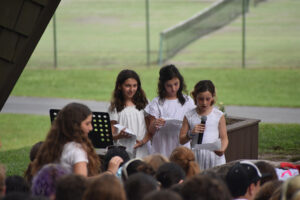
Harper – Our theme this Shabbat is Rachamim which means acting with your heart. That can mean helping a friend when they are sad or even giving them a gibbet when they don’t have any. I remember on my first day of camp I was scared and lonely. I had never been away from my parents for so long, and I had never been to an overnight camp. I didn’t know what to do. My counselors and friends helped me feel better using Rachamim.
Leni – One way I practiced Rachamim is when I helped others get through tough times. When others are upset I usually come and ask them if they need some comforting. I feel happy when I help others because it feels like a good deed. For example when I saw a friend of mine who was upset, I went over and asked if they would tell me what happened. First, I gave him a hug and then I went and whispered to him that it would be ok.
Elizabeth – One way I practice Rachamim is helping others through tough times. It feels good to help others because it can make them feel better. It can be as simple as giving them a little toy. In my first year of camp I missed my parents, but my friends helped me through it. These are some ways that I use Rachamim.
Matteo, Liam, Zach
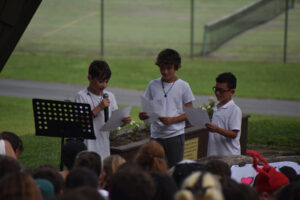 Matteo: The Barchu is a call to prayer.
Matteo: The Barchu is a call to prayer.
Liam: We believe that by being called to prayer is being called from your heart.
Matteo: One way to show Rachamim is to listen to each other. I had to listen when my friends had ideas for this speech.
Liam: In a community, it might be hard to listen. You might have ideas and might not be listening to what everyone else has to say.
Zach: Another way to show Rachamim is to talk it out rather than going straight to anger. We all have had bad moments, but now that we are older, we know we should have just talked it out.
All: While you listen to the Barchu, think about how you can show Rachamim. Na Lakum, please rise as a community for the Barchu.
Sadie, Molly, Lily
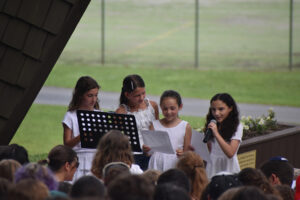
Sadie: This is my third summer at camp.
Molly: This is my second summer at camp.
Lily: This is my third summer at camp.
Sadie: When it was my first summer at camp, each of us experienced homesickness.
Lily: We were a little sad and missed our parents.
Molly: What helped us feel better was when people acted compassionately toward us.
Sadie: For example, people in my bunk started talking to me and became my friend.
Lily: When I got out of bed, my bunkmate would hear me and ask if I was ok. She would give me a hug, and my brother helped me a bit too.
Molly: We learned how to act with our hearts and welcome new campers.
Isabella: This is my first year at camp, and in the beginning I felt homesick. My friends acted with their hearts, and I felt welcome.
Lily: We all have acted with our hearts, and now it is time to act with yours.
Sammy, Ben, Bennet
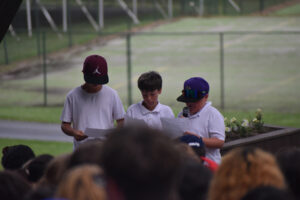
Sammy: This week’s middah is finding ways you act with your heart. One time, I acted with my heart was when I let my friend go on the low ropes before I could.
Ben: One time I acted with my heart is when I played basketball with my friend who had not been passed too much.
Bennett: One time I acted with my heart is when I donated to a homeless shelter. Acting with your heart is putting people before you. This is something that should be practiced more.
All: The opening lines of Shema remind us of uniting and when our hearts unite it creates the idea of Rachamim. Please stand or sit according to your custom for the Shema.
Ted, Caleb, Noah, Ben
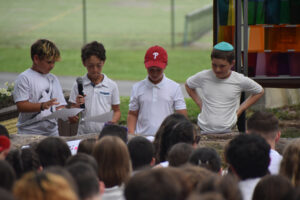
Ted: We all have acted with our hearts by helping a friend.
Caleb: Rachamim also means doing the right thing at the right time.
Noah: The Mi Chamocha is the heart of Freedom for the Israelites.
Ben: We look back to how Moses acted with his heart. He gave the Israelites freedom.
Rachel, Elenee
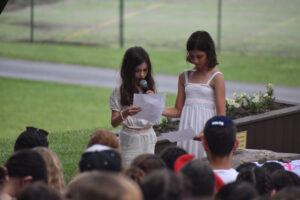
Rachel: This week’s midah is Rachamim, acting with your heart.
Elenee: The Haskiveinu speaks of G-d protecting and sheltering us.
Rachel: Your words and actions are sort of like a house being built.
Elenee: They can create a house environment of protection and shelter.
Rachel: That environment can really impact for good or bad.
Both: We challenge you to continue to create a good environment with Rachamim.
Livy, Charlotte
Livy: I acted with my heart by helping my friend when she was homesick.
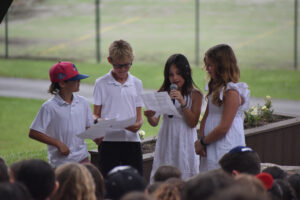
Charlotte: I acted with my heart by giving my extra blanket to my friend when she was cold.
Asher: I acted with my heart when my friend was hurt. I took him to the mirp.
Sammy: I acted with my heart when my friend dropped his snack, and I gave him mine.
All: The next prayer is Shalom Rav. It asks to bring peace to the world. We believe that when we act with our hearts we can find peace.
Georgia, Charlotte, Sasha, Noa
Georgia: At home, you have friends from your town and you spend a lot of time with them. It takes months to build a relationship. At camp it takes only hours to feel like someone is your brother or sister.
Charlotte: Your heart feels like it can expand at camp. We even have counselors and staff who come from all over the world just to be with us. All of this
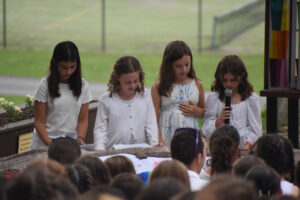
makes us feel special.
Sasha: Acting with your heart doesn’t have to be a huge thing that changes the world. It could just be lending a hand or giving someone a smile. In our case, acting with your heart could just be being together.
Noa: When we are not saying a word, we can still feel each other’s presence. At Harlam, we hope you will never get the feeling that you are alone. We now invite you to pray silently while we are together.
Hannah: This week’s middah is Rachamim which means acting with your heart. One instance of Rachamim is when my friend lost her tooth and she was upset because she couldn’t find it. I found it and then gave it to her. She was really happy and that is an act of Rachamim.
Olive: A way someone showed Rachamim to me was by welcoming me into camp on my first few days. Rachamim makes everyone feel welcome and special in their own way.
Alexa: For me Rachamim means welcoming others and including others even if you don’t know them yet. Another example is if they have been unkind and or mean to you, you still include them knowing that it is the right thing to do
D’Var Torah from Sam Blum, Assistant Director
It’s summer 2008. I am a very nervous eleven-year-old. I come to Camp Harlam and have an amazing experience.
It’s summer 2008. Taylor Swift has just scored a #1 hit on the country charts with her song “Should’ve Said No,” I, like many people, do not know who Taylor Swift is. This will soon change, for me and for those people. A few months later, she will release “Love Story,” the first single from her breakthrough sophomore album, Fearless. I will say I hate this song, but that will not be exactly true.
It’s summer 2012. I am a Chavurah camper. Camp means so much to me and weird to think that it’s, in some ways, ending. I feel like I am finally getting to know a lot of the people in my unit but I want more camp, I want to know them better, I don’t want the summer to end.
It’s summer 2012 and I definitely know who Taylor Swift is, and I definitely know that she stinks. I like Bob Dylan and Bruce Springsteen, and if I am going to listen to contemporary pop music, it’ll be a cool indie band like Vampire Weekend or Arcade Fire. Our unit does this evening program where we listen to Taylor’s song “Mean” and talk about bullying. I do not enjoy this program. Weeks after camp ends, “We Are Never Ever Getting Back Together” hits #1, the signal of another era for Taylor Swift. My dislike of her will intensify in this era, as her songs, poppier than ever, are massive hits that I hear constantly.
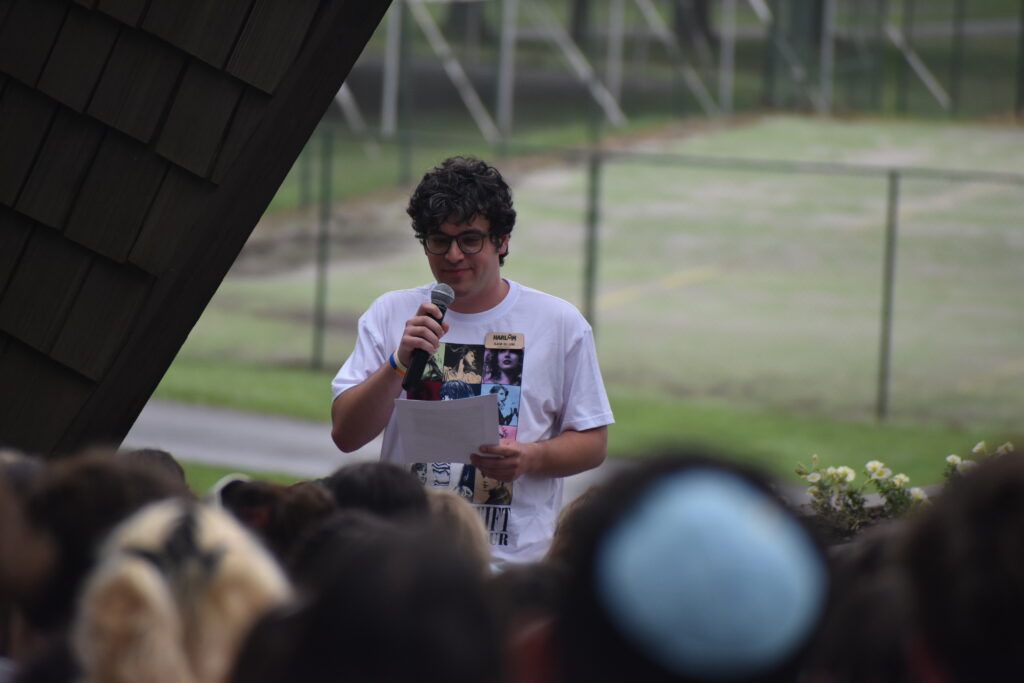
It’s summer 2013, I’m on the NFTY in Israel trip. The experience is so vivid; I can feel my life changing. On top of all this, I, like a character in a Taylor Swift song, am a teenager falling in love.
It’s summer 2013, and this girl I’m falling for – her name is Haley – plays a song for me on her iPod. It’s a Taylor Swift song called “All Too Well.” I’m skeptical, of course, because I know Taylor Swift is an overrated hack, but like I said, I’m falling for Haley, and I think she has good taste. The song blows me away. I am one of the greatest things one can be: a young person who realizes they might be wrong about something. I am halfway across the globe; my world is broadening literally and figuratively.
It’s summer 2020. All these years later and I still go to camp. Except it’s summer 2020, so I don’t go anywhere. It is challenging for my brain to process that it’s summer because I am not at camp. Haley and I, after being long-distance for years, getting by on our time at camp, now live together. We are doing our best to keep each other going during this challenging time.
It’s summer 2020. It’s the end of another long, formless day. It’s past midnight, which means Taylor Swift’s newest album, folklore, has just been released. Haley and I listen together, like we did on that bus all those years ago. Like all those years ago, I am struck by something I was not expecting. I spend the rest of the summer listening to those songs over and over and over.
It’s summer 2023. Fifteen years after pulling through the gates for my first summer, I now get to come to camp as a member of our amazing and welcoming full-time team. It’s surreal.
It’s summer 2023. A decade after hearing “All Too Well” for the first time, I am singing along to “All Too Well” with Haley and another 70,000 Swifties. It’s a summer Friday night, and on this Shabbat in Pittsburgh, I am reliving my memories of this song about reliving memories.
On the Eras Tour, Taylor takes the audience on a journey through her various, well, eras – the albums she released, each with its particular vibe and style. This pop superstar essentially cosplays as different versions of herself, reminding the attendee of different parts of their lives, different moods, different moments in time.
When I attended the Eras Tour, I was once again the skeptical, perhaps elitist preteen. I was once again the nervous kid on the bus with his crush. I was once again stuck in my apartment, holding on to songs for comfort. I was so many people I had been.
At Camp Harlam, we talk about being the best version of ourselves. That Shabbat in Pittsburgh, Taylor reminded me that she – and hopefully I, and all of us – have a possibly limitless collection of “best versions.” We can be joyful; we can be sad. We can be social; we can be introspective. We can be broken-hearted, or open-hearted, or maybe even both at once. And no matter what we are, we can always act with our hearts. In fact, the music of Taylor Swift encourages us to follow our hearts, to stand by who we are and how we feel. And that changes. It constantly changes.
Through all that change, though, things can circle back around, reminding us that our hearts will lead us to the same things in new ways. It echoes like the chorus of a song we love. Or hate. Or have heart-filled mixed feelings about.
It’s July 7, 2023, right around fifteen years on from where this story began, and somehow this is all happening again. I am at camp, having a very new experience at this place I’ve known so well for so long. That Taylor Swift breakthrough album is out again, today, new and old at once. Some people love it, some hate it, all guided by their hearts.
And that is how I hope to be, and how I hope all of you will be on this Shabbat. Love Taylor Swift or hate her – and I know, as I’ve spent much time doing both – she knows how to act with her heart. May we all follow in her example.
Shabbat Shalom.
Galil’s Saturday Morning Service
Rafi, Josh, Alex M., Elijah, Caden
Josh: The theme of this week’s service is Bitachon Atzmi, which means confidence and independence.
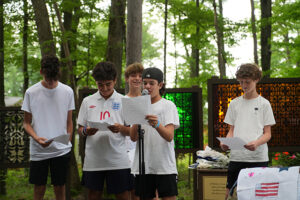
Caden: I came to camp for the first time this year only knowing a few people, but I was confident I’d make some new friends, and I did!
Elijah: Now that we are in the oldest unit in Junior camp, we have to be more independent to serve as role models to younger units.
Alex: One time I had confidence was when I went up against Pinemere players older than me during the Pinemere soccer match. Even though we lost, I played with confidence until the very last minute.
Rafi: Now that most of us are Jewish adults, we have to be more independent in our lives to live up to that title.
Josh: I had to be confident before my bar mitzvah that I would do a good job and not mess up.
Elijah: These are some ways that confidence and independence connect to our lives in and out of camp.
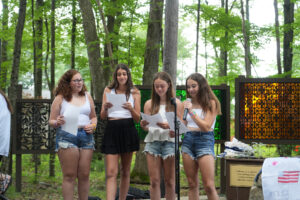 Mikayla, Talia, Emily, Zoey
Mikayla, Talia, Emily, Zoey
Mikayla: This weeks middah, bitachon atzmi, confidence, and independence is one that we can easily connect to.
Talia: Camp is an experience where you learn to find independence and prepare yourself for future events.
Emily: At camp, we can find independence by being away from home and the people who support us while also having new responsibilities.
Zoey: I find independence by trying new things. For example, this year, I tried high ropes, which is something I haven’t had the confidence to do in my past years at camp.
Emily: Confidence is something that is hard for people to find in themselves.
Zoey: However, at camp it’s easier to find confidence with the non-judgmental spirit of your friends.
Talia: Confidence is an essential characteristic that is needed for many situations, but at camp, it is easier to find confidence when you feel like yourself and are around such a special community.
Mikayla: I find my confidence at camp when I spend time with my friends, who help me bring out my best self.
Jeanine, Talya, Sadie, Sarina, Sophie
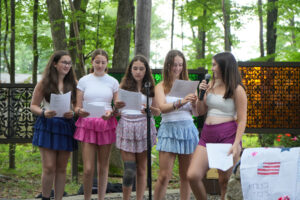
Jeanine: When we learned our middah for this week was bitachon atzmi or confidence and independence, our jaws dropped.
Talya: Our bunk has always brought out confidence in ourselves and others by lifting each other up and having a nonjudgemental environment.
Sadie: On the other hand, we’ve struggled with finding the right time to be independent versus relying on other campers and counselors for help.
Sarina: Knowing we’re going to be in K’far next year, we won’t have as much one-on-one time with our counselors, so we’ll need to learn to solve some of our own problems.
Sophie: Even though confidence is important, it’s necessary to have a balance between being lifted up by your peers and counselors or solving your problems on your own. This is what camp is all about.
Jeanine: The Sh’ma is about listening and communicating, which are values we can connect to bitachon atzmi. Having independent strength is increased when you listen and are aware of your surroundings, and the Sh’ma shows us this.
Talya: As we join in the Sh’ma, think about your own balance between communication, confidence, and independence.
Alex, Emma
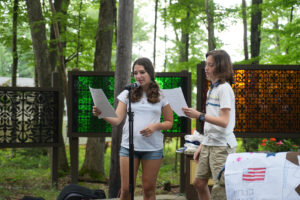
Alex: The next blessing is “creating light,” otherwise known as “yotzeir or” in Hebrew.
Emma: creating light can mean many things, whether it’s brightening someone’s day or encouraging them to see the light through a bad situation.
Alex: seeing the light or helping someone else can show confidence and independence
Which, in fact, is our middah!
Emma: Be sure to show this around camp to brighten up other people’s lives.
Maddie, Rachel, Sarah, Julia, Olivia
Sarah: The Mi Chamocha is about freedom, and with freedom comes responsibility, and with responsibility comes independence.
Maddie: A way I have shown independence is by not letting others impact my decisions and personal choices.
Olivia: In my first year of camp, I was very homesick, but I ended up gaining enough confidence to stay and enjoy my summer. Now I am here for my 4th summer at camp, and I have so many more friendships and memories.
Rachel: Confidence is important at camp so you can feel good about what you’re doing and how you’re doing it.
Julia: Independence is also important at camp because you have to be responsible for your actions.
Sarah: All of this relates back to our midah, Bitachon atzmi.
Maddie: It is important to show Bitachon atzmi everywhere.
Rachel: So that we can think about our actions and how they can impact others.
Chloe J, Lila A, Stella S, Liza Z, Liv S, Maya R
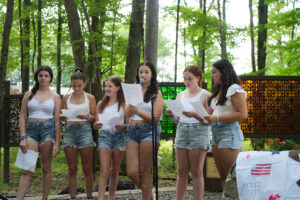
Chloe: On Shabbat, we can participate as a community or we can focus on things we do independently.
Liza: As a community, we join together in prayer, singing and putting our arms around each other, not always thinking about what the prayer really means.
Stella: Individually, we can take the time to think about what the prayer means to us and how we interpret it in our daily lives.
Liv: When we join together in Yis’mchu, we think about how fun it is as we sing along with our bunkmates we think about how fun it is as we sing along with our bunkmates and all of camp.
Lila: but on Shabbat, we should also take the time to reflect and focus on ourselves as individuals.
Maya: as we sing Yism’chu we encourage you not only to have fun but also to think about what it means to you individually.
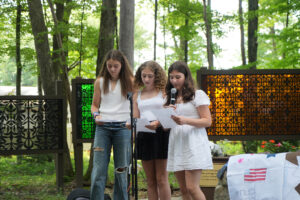 Olivia, Allie, Mira
Olivia, Allie, Mira
Olivia: At camp, I have struggled with meeting new people and putting myself out there.
Mira: I have struggled with homesickness and missing friends and family
Allie: and I have struggled to find time to focus on myself. However, although we have all dealt with different struggles, we still embrace the middah of Bitachon Atzmi by:
Olivia: Finding the courage to talk to new people, however scary it may be.
Mira: Assuring myself that I have another family here at camp
Allie: and finding those little moments where I can take time for myself.
Olivia: finding confidence in ourselves during times of uncertainty and insecurity have allowed us to find a sense of blissful independence.
Mira: We hope that you find your own confidence and independence this Shabbat.
All: Shabbat Shalom!
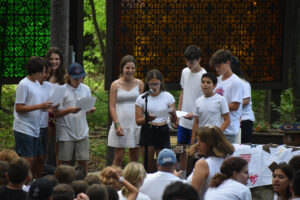 Shabbat Sha-Raps
Shabbat Sha-Raps
Saturday Morning and the peeps are here. It’s time for shabbat let me get a cheer. We will talk about Moses, Aaron, the Levites too. AYOO Galil, you know what to do.
Moses was told to divide up the promised land
But there were 5 daughters that tried to take a stand
The daughters wanted their dad’s land back
And Moses said no, but God stopped him in his tracks
God said to listen to them and give them the land
Moses finally decided to give them a helping hand
There was a census of Israel that counted the population
To divide the land amongst the nation
God was mad at Moses and said he was going to die
Before Moses entered Israel and they didn’t see eye to eye
Moses said please let me in with my people I’ll go
God said NO! Gotta give someone else a chance yknow?
So Moses found a mighty man who he knew could succeed
Joshua would keep on fighting even if he started to bleed
Joshua led the Israelites into the fight
And they were able to take over the promised land with their might
Then later in the Parsha, we get some info
God says to Moses I need these offerings, yo
The Israelite people brought sacrifices day and night
To show thanks and devotion to their God of might
Lilliana, Aliyah, Lilah, Ellie, Ben
We can all agree middle school can be a challenging time in our lives. We worry about all kinds of things, from bad teachers to gym class, drama with our friends, and our own self-image. At 13, confidence and independence can be hard! However, camp gives us relief from that stress and helps us regain self-confidence and independence. For example, we can find independence when we take our own cart into the kitchen. At camp, we also learn self-confidence when we think we can’t do something like climb the tower, but we think confidently and try to climb it anyway. When we make it to the top, it makes us feel good about ourselves and like we can accomplish anything.
